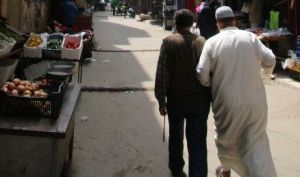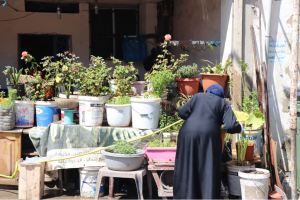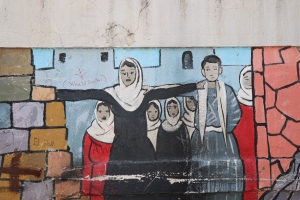In November 2017, Dr Estella Carpi from the Southern Responses to Displacement research team took part in a conference entitled “Winning Back the Human Race: a conference on the legacy of the Independent Commission on International Humanitarian Issues.” In this blog Dr Estella Carpi reflects on the multiple contributions to the conference and the need to reconceptualise the modalities of intervention in the humanitarian sphere.
This blog was posted on the 18th of June, 2018.
Southern Responses at Chatham House ‘Winning Back the Human Race’ Conference
By Dr Estella Carpi, Research Associate, Southern Responses to Displacement project.
Organised by the Royal Institute of International Affairs at Chatham House and the Overseas Development Institute the conference reflected on the legacy of the Commission, which convened between 1983 and 1986. In 1986, the Independent Commission on International Humanitarian Issue’s (ICIHI) Secretary General, Zia Rizvi, noted the purpose of the Commission; to ‘promote greater awareness of the human dimension in the countless problems which confront the global community.’ The conclusions and recommendations of the Commission were brought together in a final report called ‘Winning the Human Race.’
And, in line with the Southern Responses to Displacement research purposes, the “Winning the Human Race” report endeavors to internationally acknowledge self-definitions of Southern humanitarian actors and other providers, with the intent to encourage appropriate action and greater international cooperation. Indeed, the so-called universal consensus on how to take appropriate action and cooperate has historically not drawn upon non-western cultural, legal, and religious traditions. For example, the humanitarianism of the International Commission of the Red Cross (ICRC) is only a branch of humanitarian history, but it still gate-keeps the master narrative.
‘Winning back the human race’ is a meaningful title for the conference, as it relates to the major challenge faced by contemporary society. This challenge cannot be met without placing human welfare at the centre of national and international policy-making. Speaking at the conference, Prince Bin Talal, an early convener of the ICIHI, argued that one of the main purposes of the Commission was to ensure the same level of expertise is dedicated to humanitarian concerns as is usually accorded to economic and security matters.
The conference also discussed the need to make an ethic of human solidarity finally emerge whilst at the same time recognising the limits and the opportunities that global politics provides. Baron David Owen’s words emphasised the necessity to recognise politics in humanitarian action, and, to the same extent, the need for accountable people in the humanitarian system. From his perspective, what primarily lacks nowadays is therefore public accountability. Saba al-Mubaslat, from the Humanitarian Leadership Academy, instead contended that “civil society actors cannot do much to pressure governments to do the right thing”. However, contrarily, Sara Pantuliano, from the Overseas Development Institute, emphasised how we can still change NGO politics although certainly not Politics. An example of this could be teaching International Humanitarian Law to NGO workers.
In this regard, participants noticed how the public space of humanitarian critique has increasingly been depoliticised, therefore leading to a lack of political will. By underscoring the importance of building bakeries rather than distributing bread while the World Food Programme (WFP) declares powerlessness in changing its mandate, Saba al-Mubaslat pointed to political actors as the only realistic agents of legal and political changes. However, flexibility and adaptation struggle to find room in the political and humanitarian systems.
By a similar token, Jeff Crisp, from the University of Oxford and former Head of Policy and Evaluation at UNHCR, stressed how UNHCR became a weaker and weaker advocate of change and influence over states throughout history. Participants also pointed out that the artificial classification of migrants into “economic or unforced” and “forced” conceal the diversity of vulnerability which induces people to move, therefore overshadowing protection issues.
The areas gate-kept by rebels in today’s conflict-ridden Syria suffer from lack of protection, being ignored by humanitarian actors who try to avoid financing extremist groups. In this sense, Lina Khatib, from Chatham House, provided the example of the Idlib region in Syria where welfare is scant, and where people are not supported. “Many charities receive money to operate in areas they are told to stay in”, she added. Starvation and mass destruction weapons are increasingly used in conflicts to eliminate opposition parties and erase opposition majority areas.
Thus, the “new wars”, mostly fought at a domestic level, tend to generate a larger number of civilian casualties than in the past. This happens in a humanitarian framework in which practitioners decreasingly put themselves in the actual condition of providing appropriate help, but they are rather expected to comply with an operational logic which purports to put such help in practice. As Jeff Crisp affirmed, there is now a strong focus on solutions and a widespread use of the language of “unprecedentedness” that dangerously sweeps away historical legacies and motivations running across different crises and geographic regions. What seems to be historically unprecedented is rather how minimum the humanitarian standards have become.
Yet, those “minimum” standards have never been agreed on by some parts of the world. As it is possible to read in the Commission’s document, new actors were already emerging in the humanitarian scene over the 1980s, bringing in cultures and ideologies that did not participate in formulating international consensus on humanitarian norms. As a result, “It is not surprising that they feel little obligation to abide by it” (p. 8). In this vein, the document defines reciprocity and solidarity in terms of “enlightened self-interest” (p. 9).
In an alternative form of humanitarianism – which does not accept to be reduced to alleviation of suffering (p. 139), but rather incorporates human solidarity and infrastructural improvement – the Commission’s final report tackles fundamental contemporary issues such as women, youth, modern technology, and the media vis-à-vis the need for an effective human ethic which all peoples identify with. In this framework, the discussion of the Independent Commission’s document allowed humanitarian experts at Chatham House to tackle the shift from a fractured view of human welfare to the need of providing a holistic view that guarantees and reflects common interests.
In this sense, unraveling Southern conceptions and modalities of intervention in the humanitarian sphere, which underlies the Southern Responses research rationale, is crucial to question the still unilateral and culture-centric conception of “common interests”. Challenging the feasibility of the Independent Bureau’s purposes, how should we rethink universal action to address suffering – in turn, proof of a universal humanity – if responding to it has historically become a “universal” moral code which many have not agreed on?
For more information on the Southern Responses approach to our research read:
Histories and spaces of Southern-led responses to displacement: In this blog post Dr Elena Fiddian-Qasmiyeh highlights the need for the analyses of local responses to be more attentive to the longstanding history of diverse “local/Southern” actors and examines the ways in which Southern-led responses can work alongside, or explicitly challenge, Northern-led responses to displacement.
Southern Responses to Displacement: Background and Introduction to our mini blog series: In this introduction to our mini blog series Dr Elena Fiddian-Qasmiyeh gives and overview of the background to the Southern Responses to Displacement project and the approaches used to better understand the motivations, nature and impacts of Southern-led initiatives to displacement from Syria.
Featured Photo: Sunset over Baddawi. (c) E. Fiddian-Qasmiyeh. 2018




Reblogged this on mabisir ما بيصير.
LikeLiked by 1 person